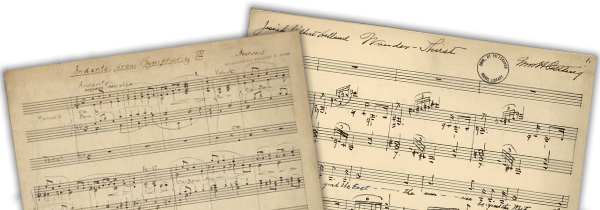The Social Orchestra was entered for copyright deposit on January 26, 1854, by Firth, Pond & Co. The collection of 73 instrumental arrangements for household music making was incredibly popular and included Foster’s arrangements of both his own songs and works by other composers:
- Old Dog Tray, by Stephen Foster
- Twilight Song, by Henry W. Pond
- I Love the Merry Sunshine, by Stephen Glover
- Old Folks at Home with Variations, by Stephen Foster
- Will You Come to My Mountain Home, by Francis H. Brown
- Hohnstock Polka, by Adele Hohnstock
- Saratoga Lake Waltz, by Frederick C. Grambs
- Love Launched a Fairy Boat, by James Howard Tully
- Widow Machree, by Samuel Lover
- Waltz, by Beethoven
- Commence Ye Darkeys All, by W. D. Corrister
- Bridal Waltz, by Louis Antoine Jullien
- Wait for the Wagon, by Anonymous
- Nancy Till, by Anonymous
- Cally Polka, by Anonymous
- O Would I Were a Boy Again, by Frank Romer
- Nelly Was a Lady, by Stephen Foster
- Sontag Polka, by Giulio Alary
- Eulalie, by Stephen Foster
- Roll On, Silver Moon, by [Jane?] Sloman
- My Old Kentucky Home, by Stephen Foster
- Thou Art Gone From My Gaze, by George Linley
- On the Banks of the Guadalquiver, by Louis Henry Lavenu
- I’d Offer Thee This Hand of Mine, by L. Thayer Chadwick
- The Wild Haunts for Me, by Anonymous
- Broadway Quickstep, by Josef Gung’l
- Agatha, by Franz Abt
- Evening Star Waltz, by Joseph Franz Karl Lanner
- Pearl Polka, by Henry Kleber
- Scenes That Are the Brightest, by William Vincent Wallace
- Come Where the Fountains Play, by Gaetano Donizetti
- Will You Love Me Then, As Now?, by Francis Weiland
- Irene, by Stephen Foster
- Italian Melodies No. 1, by Giuseppi Marco Maria Felice Blangini
- Italian Melodies No. 2, by Gaetano Donizetti
- Italian Melodies No. 3, by [Ferdinando?] Bertoni
- Italian Melodies No. 4, by Nicola Vaccai
- Italian Meldoies No. 5, by Wolfgang Amadeus Mozart
- Anadolia, by Stephen Foster
- Duett from Lucia di Lammermoor, by Gaetano Donizetti
- Would I Were with Thee, by Carlo Bosetti
- Pirate’s Chorus, by Michael William Balfe
- Massa’s in the Cold Ground, by Stephen Foster
- Katy Darling, by Vincenzo Bellini
- The Hour for Thee and Me, by Stephen Foster
- The Old Pine Tree, by Charles White
- Make Me No Gaudy Chaplet Now, by Gaetano Donizetti
- On to the Field of Glory, by Gaetano Donizetti
- Introduction to Caliph of Bagdad, by François Adrien Boieldieu
- March from the Daughter of the Regiment, by Gaetano Donizetti
- Waltz, by Strauss
- Byerly’s Waltz, by William Byerly
- Rainbow Schottisch, by Henry Kleber
- Gems from Lucia No. 1, by Gaetano Donizetti
- Gems from Lucia No. 2, by Gaetano Donizetti
- Gems from Lucia No. 3, by Gaetano Donizetti
- Jennie’s Own Schottisch, by Stephen Foster
- Maria Redowa, by Gaetano Donizetti
- Air from Preciosa, by Carl Maria von Weber
- Air by de Beriot, by Charles Auguste de Beriot
- Coral Schottisch, by Henry Kleber
- Waltz by Lanner, by Joseph Franz Karl Lanner
- O Summer Night!, by Gaetano Donizetti
- Where Are the Friends of My Youth, by George Arthur Baker
- Crystal Schottisch, by William Byerly
- Ton-Mahrchen Waltz, by Joseph Gung’l
- Gems from Lucia No. 4 (I’ll Pray For Thee), by Gaetano Donizetti
- Gems from Lucia No. 5, by Gaetano Donizetti
- Village Festival, by Stephen Foster
- Old Folks Quadrilles, by Stephen C. Foster
- French Quadrille[s]
- French Quadrille No. 1, by Jean Baptiste Tobeuque
- French Quadrille No. 2, by Bosissio
- French Quadrille No. 3, by Bosissio
- French Quadrille No. 4, by Jean Baptiste Tobeuque
- French Quadrille No. 5, by Anonymous
- La Sérénade, by Franz Schubert
- Happy Land, by Edward Francis Rimbault
In 1863 Firth Pond & Co.’s printing plates passed to William A. Pond, who reprinted the collection in 1866.
According to Evelyn Foster Mornweck’s The Chronicles of Stephen Foster’s Family:
Stephen wrote to Morrison from New York on July 8, 1853, saying that he had plenty of work to keep him busy. And indeed, he must have had, because the following January, Firth, Pond & Company published, in addition to his songs, Foster’s Social Orchestra which is a compilation of many of Stephen’s own compositions and the works of others arranged as solos, duets, trios, and quartets for piano, violin, and flute. The book contains waltzes, quadrilles, polkas, schottisches, and quicksteps, the popular parlor and ballroom dances of the day. Several of Henry Kleber’s and William Byerly’s compositions are introduced, and Stephen’s complete “Village Festival,” a very lively and tuneful piece for five sets of quadrilles. Dancing at home was a universal diversion; the better class of people did not allow their daughters to attend public ballrooms unless the party was a private one. Therefore, the young people provided their own music, and Stephen’s book had a large sale. It reveals a great deal of patient work on Stephen’s part. Stephen’s Social Orchestra contains two compositions of his that never have been published in sheet music form, a graceful melody called “Anadolia” and a piece evidently composed to please his wife, for he called it “Jennie’s Own Schottisch.”
